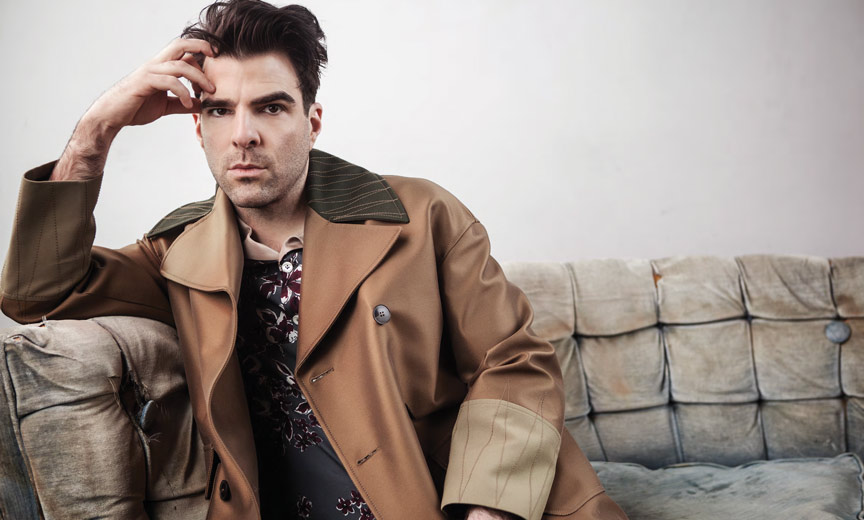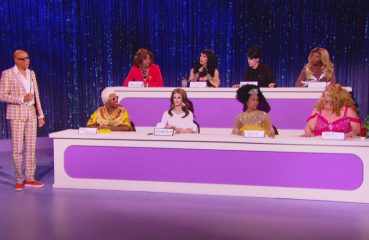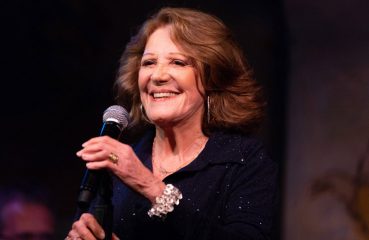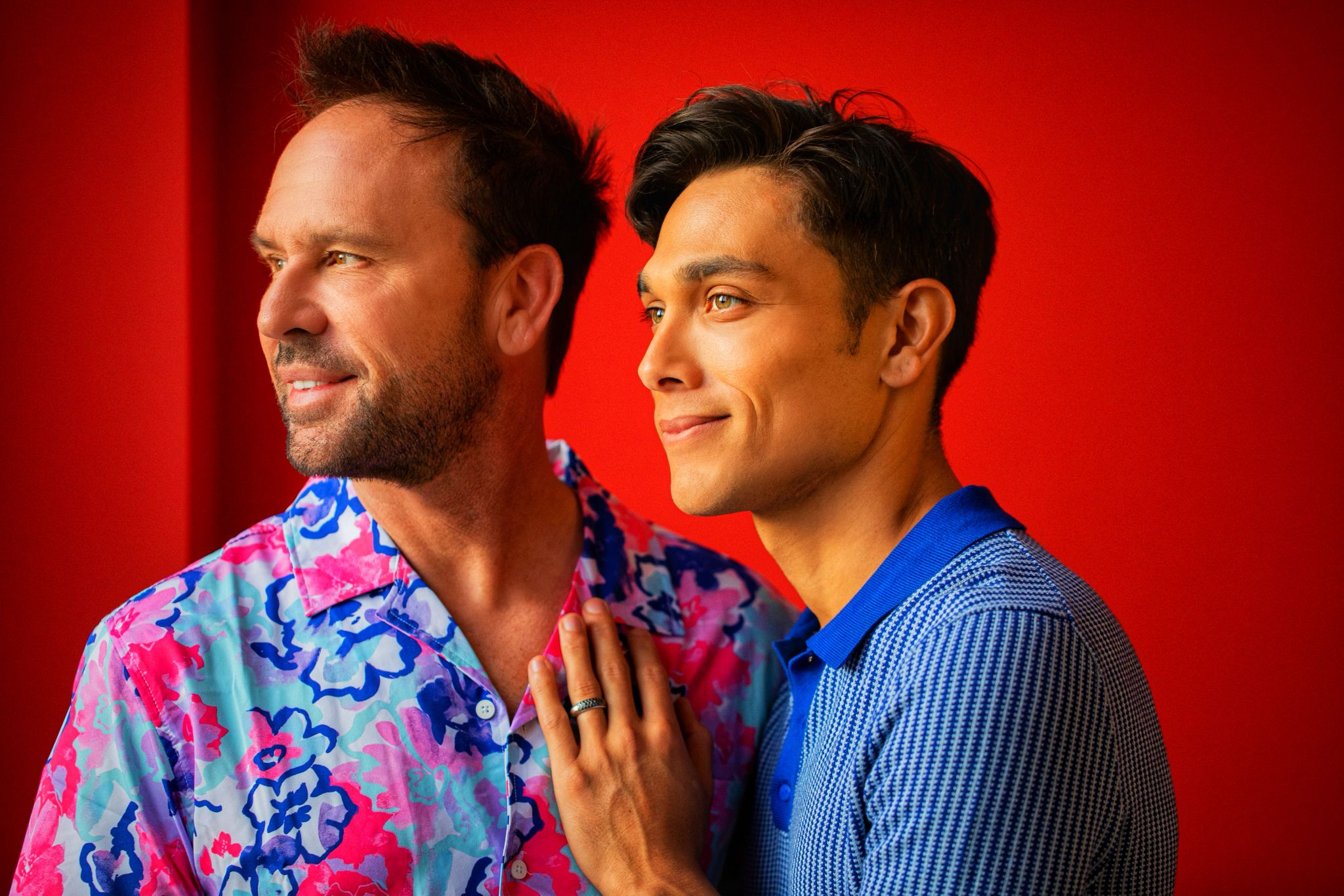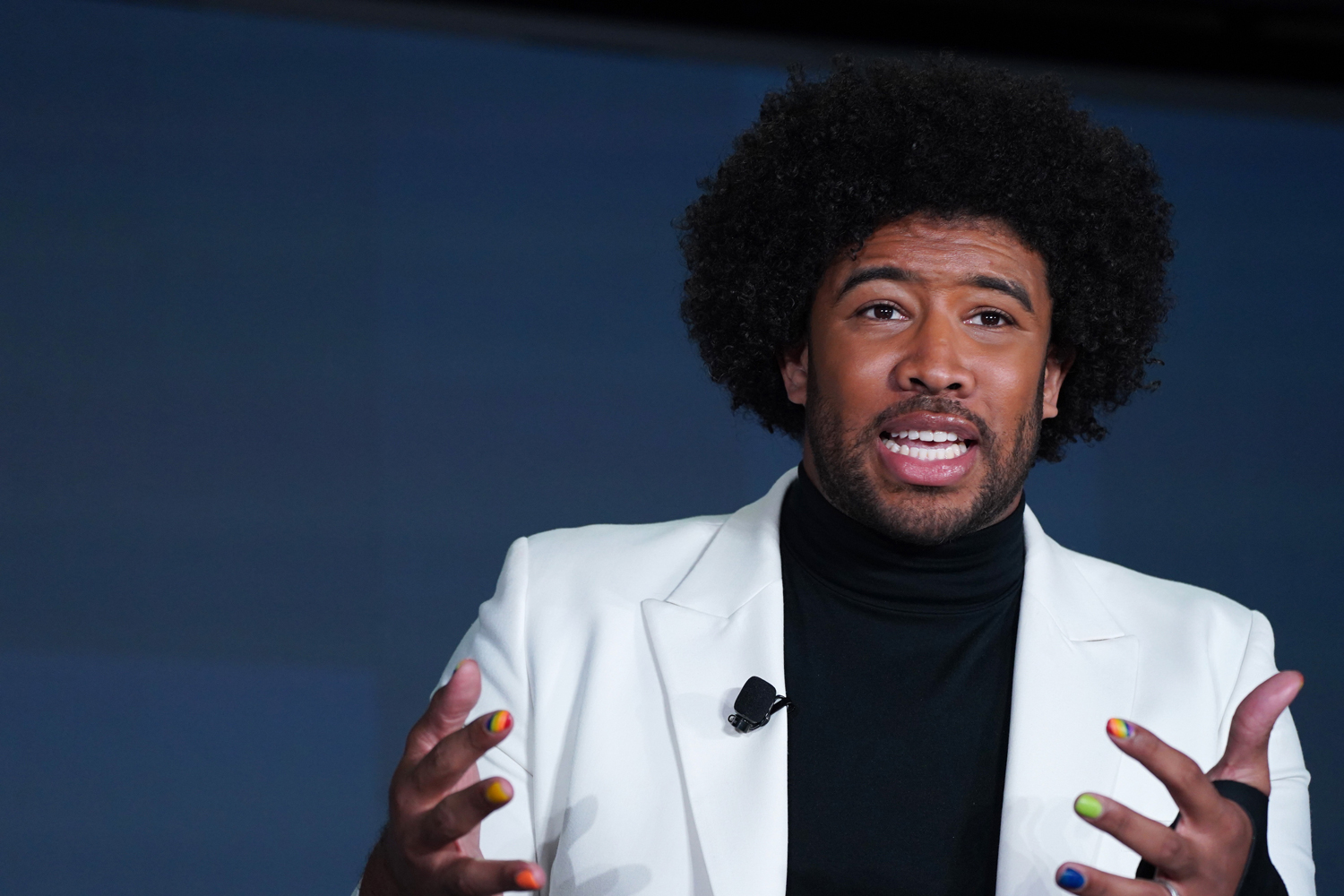Although he wasn’t even born when Boys in the Band was first staged 50 years ago, this touchstone of gay culture still resonates for Zachary Quinto — as an actor and member of the LGBTQ community.
There’s something about Quinto. Whether it’s his breakout role as superpowered serial killer Sylar on Heroes, following in Leonard Nimoy’s footsteps as Star Trek’s science officer Spock, or as a shrink with a secret on American Horror Story: Asylum — that leaves a nagging sensation that there’s more to his characters than meets the eye. It’s almost as if, while you’re watching them, they’re watching you: studying you, assessing your strengths, committing each imperfection to memory.
Read Next | Destination Weddings: Saying “I DO” in Pennsylvania
Now Quinto is bringing his keen intellect to a play that many thought might never be seen again: Mart Crowley’s pre-Stonewall cult classic, The Boys in the Band, reimagined by director Joe Mantello. By turns, it’s a tale both funny and ferocious, as nine men convene to celebrate the birthday of their friend Harold, a self-deprecating queen who slyly slips in and out of the action to maneuver his friends as if they were pawns in a 3/D chess match.
Not surprisingly, that’s Quinto’s part.
Find LGBTQ-Friendly ResourcesQuick to counter, Quinto says, “I never think of Harold as three steps ahead of everybody in the room. I think that of the nine personalities in the show, Harold is the most self-explored, self-examined and ultimately self-accepting of the group. I think he knows his own self-loathing, and as a result it doesn’t really have as much power over him as it does over some of the other characters.”
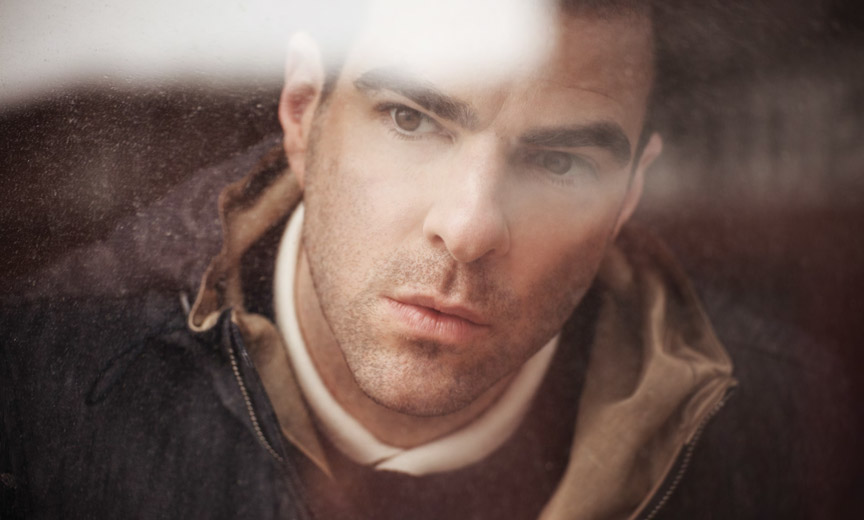
Photo courtesy of Brent Chua
These are Quinto’s early impressions of Harold, and as a good citizen of the theater (including a 2014 turn in Tennessee Williams’ The Glass Menagerie opposite Cherry Jones), he well knows the path ahead will have its share of twists and turns: “Of course,” he says, “this is all from my perspective, and some of my fellow castmates could disagree. We start rehearsals tomorrow, so I might change any of these perspectives as I get more into the process.”
Read Next | This Is How You Can Get Ripped for Summer by Eating
Loss . . . and Recovery
Quinto’s love affair with the stage began early in his native Pittsburgh. After losing his father at the age of seven, Quinto saw his mother forced to reinvent her life in order to support her two sons. “There was a natural period of adjustment (after his father succumbed to cancer) and contraction within my immediate family,” he says looking back. “And, you know my Mom — who had been a stay-at-home Mom to that point — had to go to work and had to raise two sons on her own.
“I think acting for me was a bit of a combination of exploring my internal emotional life and processing a lot of the things that had happened,” he reflects. “Logistically from a practical standpoint, it was an outlet for me, a way for my Mom to know that I was safe; that I had structure, that I had stimulation and that I was doing something productive with my time after school and on the weekends.”
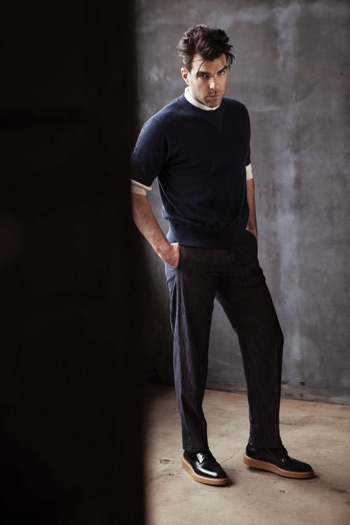
Photo courtesy of Brent Chua
He remembers that becoming a performer was “a very organic process,” even at the outset. Still, “it very quickly evolved into something beyond just a childhood hobby.”
Quinto also spent those formative years navigating toward a greater certainty of his sexual orientation, grappling with both the internal and external homophobia every young person faces at the possibility of being gay. Understanding that struggle was key to his approach to the scathing repartee that ricochets between the characters in Boys in the Band.
“There’s a strong current of witticism and intellect that runs through the gay community in the face of persecution and bullying,” Quinto says. “The tongue being mightier than the sword, in a way, is a line of defense. That’s also part of how I think so many members of the gay community have come to be such impactful intellectual minds and insightful, observant, hilarious documenters of the social experience.”
“I feel like as a young gay kid — or at least confused kid — there were certainly ways in which I had to learn how to evade potential conflicts or potential volatile situations, and I did rely on both wit and intellect to do that,” he’ll allow. “So I certainly relate to that aspect of Harold. He’s an incredibly savvy and articulate person, and I can relish in that as a character. I like to excavate those parts of myself and try to bring them to life as much as I can.”
Read Next | Sailing Your Way to Good Health
Is Hindsight 20/20?
Quinto was born in 1977, nearly a decade after Boys in the Band took New York by storm with its radical depiction of a Manhattan apartment full of gay men unable to be themselves safely outside in the world at large. And although being surrounded by familiar faces offers them a degree of comfort, the play’s pressure-cooker atmosphere ultimately provides opportunities to see each character at his best — and worst.
Elements of the show evoke memories of victories since won (the play opened two weeks after Martin Luther King was killed, a full year and a half before the riots at Stonewall). Other aspects make clear that despite changing times, human nature remains stubbornly constant. As such, the piece is very much a fly caught in amber: forever trapped in time.
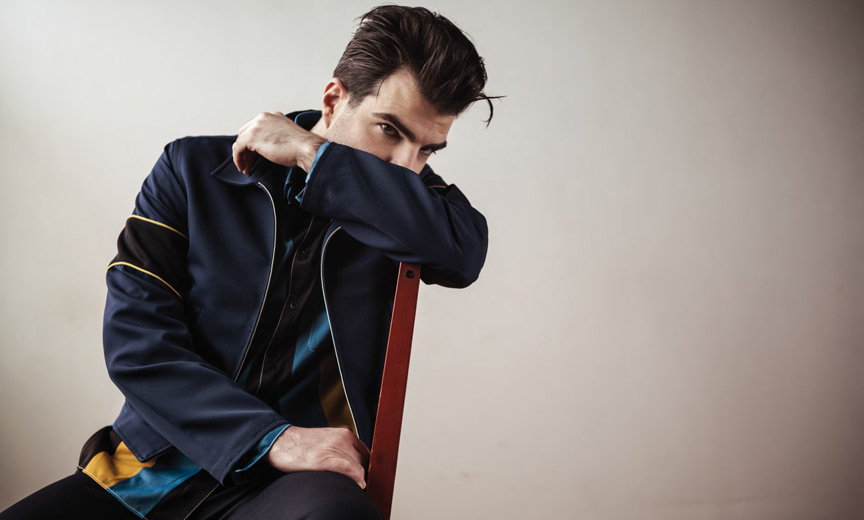
Photo courtesy of Brent Chua
“There’s no way to move it to present day,” the actor maintains. “I think the play itself exists in the social/political context of the time, so my sense is that we’re stripping away the kind of time period tropes of costumes and a kind of naturalistic set. I think we’re trying to suspend the play in a place where the language can do the work, you know? Where the play itself can be a mirror for the audience to reflect how far we’ve come in the last 50 years; but also how far we’ve yet to go in terms of integrating homosexual identity into mainstream culture.”
Read Next | These Are the 10 Best Lesbian Films of All Time
In fact, this production marks the first time The Boys in the Band has appeared on the Great White Way. Crowley’s play first found favor as an underground “happening” that achieved cult status far from Broadway. The show went on to become a well-known film in 1970 — featuring the very same stage cast — directed by William Friedkin (who would go on to greater fame three years later as the director of The Exorcist). Now the play is back in the biggest way possible, starring a Who’s Who of gay Hollywood heavyweights, including Quinto, Jim Parsons (The Big Bang Theory), Matt Bomer (The Magic Mike films) and Andrew Rannels (Girls, The New Normal), each contributing his own star power in hopes that the new production will in its own way compel audiences to reconsider who gay people were — and are.
“When this play premiered in 1968, it was revolutionary,” Quinto says. “It was a groundbreaking experience. People had never seen anything like it. It was a phenomenon in terms of audience attendance; people were lined up around the block, and the show moved theaters and was extended time and time again because it was such an unexplored psychological landscape.”
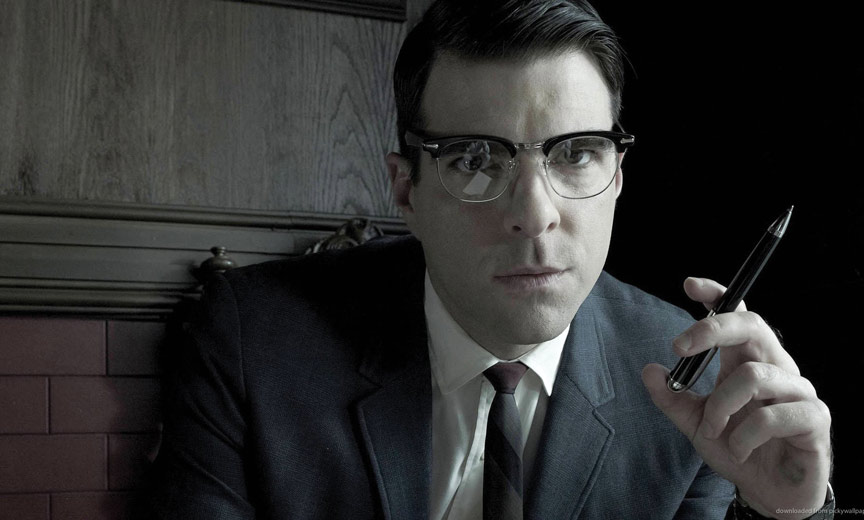
American Horror Story: Asylum — courtesy FX
But eventually — after the gay rights movement began, once homosexuality was dropped as a mental illness by the American Psychiatric Association in 1973, after the AIDS crisis — the show’s bitchiness, born in a time of claustrophobia and repression, began to appear dated.
Quinto acknowledges that Boys “became a bit stigmatized as backward-looking in a kind of reductive, stereotypical association with the gay characters.” But, he’s quick to add, “for me, that makes it interesting to be bringing it back in a time when it’s never been on Broadway. We’re living in the midst of an incredibly backward swing of socio-political points of view right now, and I think it’s a really amazing time to be able to let the play speak for itself again.”
Responsibility Comes with the Craft
For Quinto, each character is a quest: Spock attempting to master his untapped reservoirs of emotion; the lover of a man who renounces homosexuality to preach the Gospel in I Am Michael; the real-life gay journalist Glenn Greenwald on a search for truth in Oliver Stone’s biopic based on famed whistleblower Edward Snowden.
Still, for all his indelible work on screen, Quinto is on record saying that without reservation, the stage would be his choice between the two — if he had to make one.
“Don’t get me wrong,” he says with a laugh. “I’m not saying I don’t appreciate my experiences in film and television, and I’m certainly not saying I don’t want to continue having them. The balance of my career is amazing and I appreciate it deeply. I’m speaking in terms of fulfillment; satisfaction. I’m never so happy as when I’m on stage, and I feel like that’s the only thing I mean when I say: if I could make the same living as I make in film and television that I would only do theater. I don’t want to preclude or forego any further opportunities I have in film and television, because I do think there’s a unique and kind of magical potential there as well. And I value the legacy of that. There are those things that exist in film and television that don’t exist in the theater, you know? There isn’t a permanent record of the work you do on stage.”
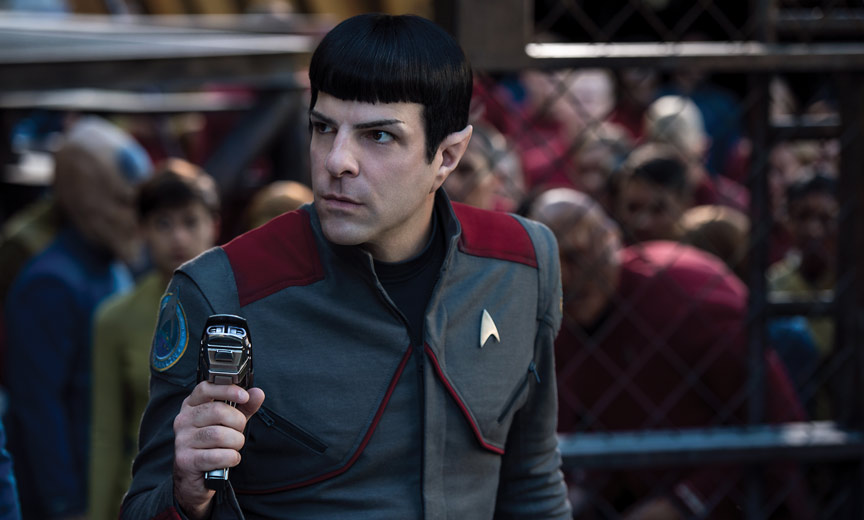
Star Trek Into Darkness—Image courtesy Paramount Pictures
But for Quinto, there is power in the fleeting present and the immediacy that only live performance can provide.
“Theater is the only medium for an actor in which they have ultimate control,” he likes to say. “Between the stage manager and the light board and the sound board operators and the actors: those are the people who are responsible for the story being told every single night.”
By contrast, he says, “You make a film; you show up, you hit your mark, you say your lines, you go home, and that’s when the work begins, because the editor comes in and the sound designer and the composer and the – well, there are so many other contributions to the art form.
“In the theater the curtain comes up, and the lights go on and then it’s in your hands,” says Quinto. “Part of the power of the craft for me is the responsibility that comes with that — but also the joy and fulfillment that comes with it. You really get to shape the experience of an audience for that two-hour period of time, an hour and 45 minutes, in the case of The Boys in the Band. But that is unique. And that to me is rewarding on a level that no red carpet or premiere or opening night party can substitute. It’s that something that requires a different kind of commitment and a different kind of effort over time. There’s something ceremonial and ritualistic about it, too — something spiritual. If you look at the origins of theater, it traces back to the Greeks and the celebration and the worship and the ritual of a kind of mass. And that’s something that I really feel moved by and kind of always have. “
Read Next | Relax From LAX: 4 Great Los Angeles Area Weekend Getaways
Where is the Love?
What does Quinto hope audiences will find memorable about this 50th anniversary production of the play? For him, it’s all about the collision of personalities in Crowley’s text.
“Each time, as I’m diving into it more deeply,” he says, “the question that keeps coming up for me is always that crucial actor question: Where is the love, you know? How are these guys truly best friends and able to walk this razor-thin line of celebrating one another and appreciating one another and also eviscerating one another? I think Harold and Michael (played by Parsons) in particular go at each other’s throats in a lot of ways through the course of this journey.”
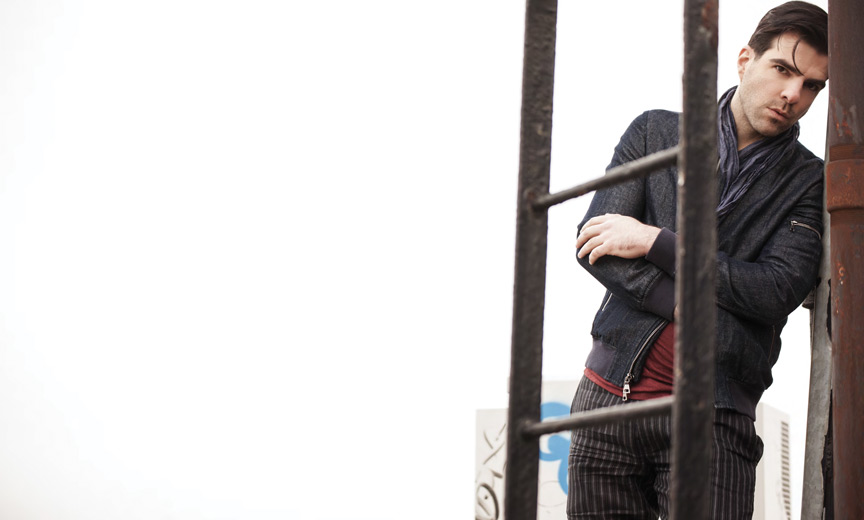
Photo courtesy of Brent Chua
“What’s so foreign about these characters and the world that they’re set against is how restricted they are in their capacity to inhabit their authentic selves,” he muses. “And that’s one of the ways in which we’ve changed so immensely, certainly in the last 50 years, but even in the last 15 years, you know? But the characters themselves… I think there’s a universality to the sense of camaraderie among a group of LGBTQ friends. Even though we’ve experienced a lot of social evolution, there’s still that sense of being a part of a minority group that creates a sense of intimate friendship.”
It’s often said in the LGBTQ community “that we get to choose our family in so many ways,” says Quinto, who finds that especially true of those who find themselves “alienated or who are put out from their own families because of their identities. And I think this play represents that. It’s a group of people who have chosen who their families are, and find comfort and find antagonism and find humor and heart in those relationships. And I don’t think that that’s necessarily any different today. I just think that it’s set against a different social/political background, and that’s why a play like this deserves to be revived and deserves to have its Broadway debut. This play captures a certain moment that thankfully doesn’t completely exist anymore. But there are certainly echoes of it, and I think that’s what we’re exploring by doing it and doing it in the way that we are.”
See Zachary Quinto in The Boys in the Band now through August 11 at Broadway’s Booth Theatre. For tickets, visit boysintheband.com.
Want Metrosource LGBTQ content notifications? Sign up for MetroEspresso.

Read Next | Find and Connect with LGBTQ Friendly Plastic Surgeons in New York
Last modified: November 22, 2019

